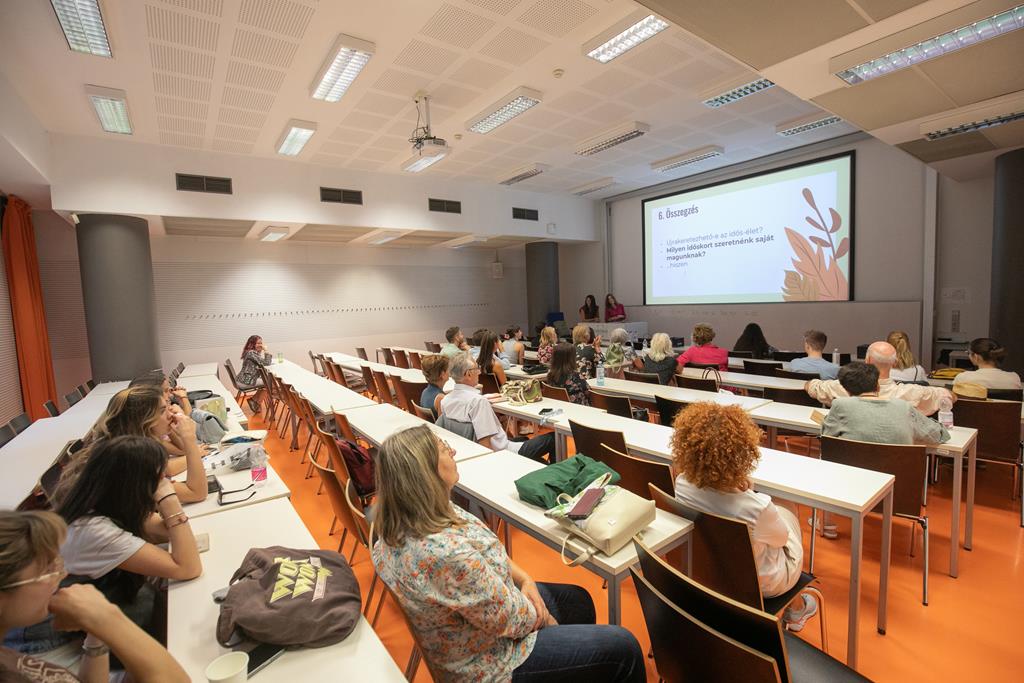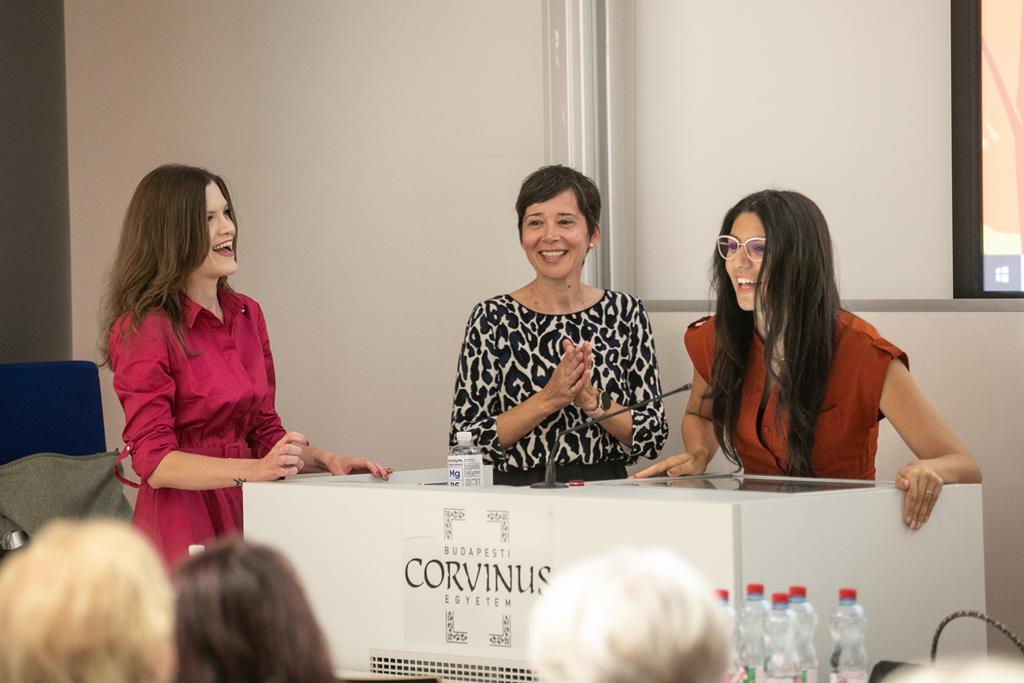When it comes to old age, our perceptions and attitudes have evolved significantly over the past 35 years. Gone are the days when ageing was synonymous with “decline” and “frailty.” Instead, the language we use to describe old age has transformed, replacing negative concepts with positive ones like “independence” and “self-fulfillment.” This social transformation initiated by baby boomers in certain countries of the English-speaking world, such as Australia inspired active ageing, namely, the initiative to lead a healthy and happy life in our later years. The new attitude to ageing – also known as “successful ageing revolution” led to the rise of activities as senior yoga, senior tourism, and retirement clubs. But has the revolution of ageing taken place in Hungary as well? How do Hungarians think and talk about old age?
These were some of the questions Réka Benczes, Alexandra Nagy-Béni and Lilla Petronella Szabó, answered in their talk organized as part of the Researchers’ Night, a public event that showcases scholars’ scientific results, at Corvinus University of Budapest at the end of September.
Currently, within the demographic landscape of Hungary, a notable statistic prevails, as one out of every five individuals has surpassed the age of sixty-five. This demographic composition underscores the significance of altering our perspectives and dispelling prevalent stereotypes concerning the elderly population, as well as fostering a more inclusive and empathetic outlook. Equally concerning is how older individuals perceive themselves, emphasizing the importance of promoting their self-esteem, well-being, and dignity within society.
Meanwhile, in the present global context, a remarkable and transformative phenomenon is taking shape – the emergence of what we can aptly term a “successful ageing revolution.” Notably, this trend is not just about longevity; it is also reshaping our perceptions of old age and how we approach our later years. As societies continue to adapt to the “successful ageing revolution,” we are witnessing an era where age truly becomes just a number, and the later years of life are characterized by vitality, productivity, and an enduring sense of purpose. Still, we should ask: is this transformation reflected in language? It is a vital concern, for language holds the power to shape and reinforce societal attitudes.
Read also:
- Guess why is it not good to grow old in Hungary? – Read more HERE
-
The free travel of the Hungarian pensioners is unique in Europe – Click HERE for more

Photo: Tamás Lékó/Corvinus University
According to Réka Benczes, the response to this inquiry is indeed affirmative. In Australian English, for instance, the term elderly is typically associated with negative stereotypes, while the word senior is indicative of a successful older individual who remains active and challenges preconceived notions. In Hungary, the term szenior is already in use. For instance, Semmelweis Medical University boasts a Senior Academy, and since 2019, the university has been providing complimentary lectures tailored specifically for this age group. Outside the walls of the university, there are events such as the senior happy dance, senior yoga, and senior Wednesday.
Nevertheless, the findings presented during this event suggest that, despite the use of the term szenior in Hungary, the Hungarian language has not undergone a complete redefinition of old age. Alexandra Nagy-Béni discussed the name and logo design practices employed by elderly care institutions in Hungary. She highlighted that 78.5% of such institutions in the country incorporate the term “old people’s home” in their names, which can carry negative connotations related to dependence and mortality. Conversely, certain institutions opt for names like “Rege Residence – Golden Age Home” and “Fairy Garden Home,” which convey a sense of exclusivity and comfort.

Photo: Tamás Lékó/Corvinus University
However, there are examples where the name of an institution may sound appealing, but its logo can elicit negative associations. For instance, logos featuring elderly couples struggling to walk or trees shedding their leaves, even if the institution’s name is positive, may not evoke pleasant thoughts. Moreover, many logos feature imagery of a helping hand, which tends to emphasize notions of dependency, abandonment, and the elderly individual’s need for assistance. Overall, the research investigating the naming practices and logo usage of Hungarian elderly care institutions also found that the rethinking of old age is present only to a limited extent in Hungary.
The next question the presentation addressed was how older adults themselves see the concept of life. In this connection, Lilla Petronella Szabó shared the results of two representative surveys that examined the way the Hungarian population perceives life. The first survey was conducted before the COVID-19 pandemic, while the second was carried out during the pandemic. It was found that the pandemic did not have a substantial impact on how older adults view life. The older generation continued to associate life with concepts like “fighting,” “war,” and “a rollercoaster.” In contrast, the 18–24 age group emphasized the importance of “play,” while the 25–39 age group viewed life as an “opportunity.” Both of these age groups also reduced their association of life with “travel” possibly due to the constraints imposed by the pandemic. Thus, the results show that older adults have a radically more negative outlook on life as compared to younger people.
In a world where perceptions of old age are evolving and embracing newfound positivity, Hungary’s journey towards redefining ageing seems to be a complex one. As we reflect on the intriguing discoveries mentioned above, we can’t help but wonder: will it be possible to re-frame old age in Hungary in the future? What kind of old age do we want for ourselves?
Written by Petra Bialkó
please make a donation here
Hot news
Exports and imports both down in Hungary – official data
Brand new Budapest Airport Hotel is on its way – astonishing VISUALS
11 EP lists to compete in Hungary on 9 June
Masses on Péter Magyar’s rally in the “capital of Fidesz” today – PHOTOS
What happened today in Hungary? – 5 May, 2024
PHOTOS: March of the Living in Budapest



